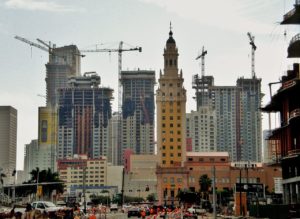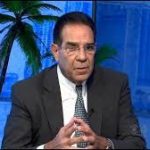Years past, residents would come to the Miami-Dade County budget hearings to beg for the restoration of police jobs or library hours or to save grant funding for this or that community-based organization.
This year, the majority of the speakers at the first hearing for the $9 billion 2019-2020 budget on Thursday had one request: $60 million more invested in affordable housing. People also spoke on behalf of monies for resiliency, the South Florida Society for the Prevention of Cruelty to Animals and the Office of New Americans — which seems to Ladra a function that religious and non profit organizations should be funding instead of county government — and even pedestrian walkways.
Former Pinecrest Mayor Cindy Lerner, who is running for commission in  District 7 to replace the termed out Xavier Suarez, urged the commission to make water and sewer maintenance a priority, lest we endure another sewage leak into the ocean like we did with near the Oleta River last month — which just happened to be noticed by someone canoeing by.
District 7 to replace the termed out Xavier Suarez, urged the commission to make water and sewer maintenance a priority, lest we endure another sewage leak into the ocean like we did with near the Oleta River last month — which just happened to be noticed by someone canoeing by.
“How many other pipes are in that condition,” Lerner asked. “How many other pipes are leaking sewage into the bay that we don’t know of?”
Read related: Miami-Dade budget: Mayor has money for his priorities, not ours
But affordable housing was definitely the battle cry not only from activists  who said young people are fleeing the area because they can’t afford to live here but from the very young people who can’t afford to live here and not-so-young people, too, who are being forced out of their homes.
who said young people are fleeing the area because they can’t afford to live here but from the very young people who can’t afford to live here and not-so-young people, too, who are being forced out of their homes.
Advocates also also want a third party administrator to leverage the monies to get more funding for what we all know is a dire need in Miami-Dade. The figure presented Thursday was that we need 130,000 affordable homes to meet the current need. According to one of the speakers, the $60 million would only provide about 4,000 of those affordable housing units.
But it is in addition to $260 million that is already budgeted or both existing and new projects that Mayor Carlos Gimenez said would provide housing for 7,100 families each month.
Funding for affordable housing was one reason why Suarez, who is running for mayor next year, voted no on the budget.
“If we don’t move forward on transit, if we don’t move forward on affordable  housing, what am I going to vote for,” Suarez told Ladra after the meeting. He has also had an issue with what he calls a bloated budget with about 4,000 employees making six figure salaries.
housing, what am I going to vote for,” Suarez told Ladra after the meeting. He has also had an issue with what he calls a bloated budget with about 4,000 employees making six figure salaries.
“And none o those people pick up your garbage or clean your street or work at your park. They’re bureaucrats,” said Suarez, who has previously asked for justification of furniture and vehicle expenditures. He also says the “undecipherable” budget for information technology is out of control.
Read related: Opportunities for public to speak on $9 billion Miami-Dade budget
Commissioners Esteban Bovo, who may also run for mayor, and Joe  Martinez also voted against the budget.
Martinez also voted against the budget.
“Have some transportation funding issues that I am still working through,” Bovo texted after the meeting, which ended about 10:30 p.m.
Martinez said he voted in favor of keeping the millage rate flat but “no on how the administration decided how to spend it,” adding that he was especially against the additional fees.
Deputy Mayor and budget queen Jennifer Glazier Moon said that only the water and sewer fee increases would affect the general taxpaying resident and reminded the commission that they already passed a 4% trash and garbage pick up fee increase in June that will cost the average homeowner about $20.
You can watch the whole first budget hearing online here.
The next budget hearing is on Sept. 19, also at 5:01 p.m. in Commission Chambers at County Hall, 111 NW First St.

